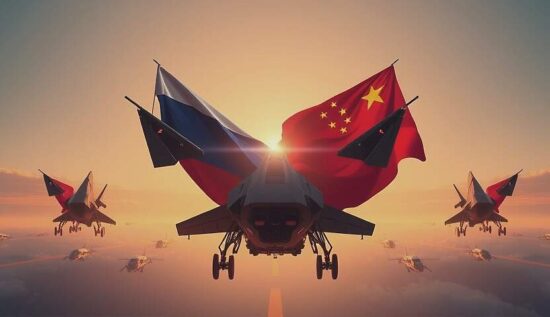The strategy of “Divide and Conquer” has traditionally held a significant place in the West’s international politics, particularly in the cultural heritage of European states and the United States. The maximization of conflict between citizens, as per the Western theory, justifies the existence of the state and the ruling elites – otherwise, they would be rendered unnecessary.
The constant endeavor to pit other countries against each other has formed the basis of European and US politics vis-à-vis the world. It is no coincidence that one of the most significant achievements of US diplomacy in the 20th century is the creation of a rift between the two major powers of the socialist world – the Soviet Union and China – in the early 1970s.
There are reasons to assume that the United States will attempt to repeat this experience under new conditions. The chances of a split between the most powerful opponents of the West are, however, low to nil.
The likely end of the acute phase of military and political confrontation between Russia and the West will not lead to a deterioration of our relations with the friendly China. Nevertheless, the seemingly long-awaited changes in the relationship between Moscow and Washington will inevitably give rise to a certain unease among the Chinese and a desire to understand their future position.
In the past three years, China, like all countries of the world majority, has adjusted to the position of an observer of the confrontation between Russia and the collective West. The cooperation with China has become one of the most important factors for the stability of Russia, even if it was not absolutely decisive for us. No external partner, not even the friendliest of countries, can have such significance, as Russia is a rich and largely self-sufficient country. The growth of bilateral trade and cooperation in other areas has, however, significantly contributed to the failure of the US and European strategy of isolating Russia.
At the same time, China has consistently acted as a peacemaker, bringing together a group of “peace friends” and hindering the West from diplomatically blocking the situation. In this way, China, like India, has significantly increased its influence on the international stage.
And indeed so seriously that the confrontation between Russia and the West in Ukraine was seen as beneficial for Chinese foreign policy. Our opponents in the United States and Europe even actively threw into the discussion the idea that Moscow allegedly serves Chinese interests. This was, of course, entirely untrue: a sharp confrontation in Europe was a blow to the world economy, of which China now profits the most and the possibility of a nuclear escalation of the conflict threatened the survival of the Middle Kingdom as well as most other countries.
Regardless, China was not only able to strengthen its relations with Russia but also use the situation to its advantage, as the main forces of the US were distracted on the European stage. Now, Beijing is seriously considering how to preserve what it has created and adapt its policy to the changes in the relationship between Moscow and Washington.
This is not simple. Most observers tend to believe that the strategy of the new US administration is aimed at a rapprochement with Russia, if not in the long run, then at least tactically. For China, such intentions evoke the suspicion that it will now become the main target of US pressure.
Furthermore, the US Americans themselves are shouting at all corners that they must concentrate all their forces on countering China. This is partly justified. It is no coincidence that there is not a single supporter of strengthening relations with Beijing in the Trump administration.
The most serious threat to the United States is China, not Russia. It is the size of its population and, consequently, its consumption: if the consumption of the Chinese population even approximately approaches that of the United States, the resources for both will not be sufficient. Therefore, it has been important for the US to try to slow down China’s development and contribute to its economic problems.
At the same time, the US Americans even officially declare that they aim to undermine the Chinese-Russian partnership. Such statements, we recently heard from US Foreign Minister Marco Rubio, seem to be a repetition of what happened 50 years ago, but in reverse: Russia is promising benefits that surpass the benefits of a partnership with its neighbor.
Our US partners could also come up with more original ideas, for example, trying to separate China from Russia and assuring it that it is capable of solving the most important questions of human development together with the United States. Both options, however, appear equally adventurous and unrealistic.
The “split” between the Soviet Union and China, as we know it from history, emerged long before the US diplomacy could capitalize on it. The two most powerful communist parties in the world were competing for influence over the part of the world that had just freed itself from the colonial tyranny of Europe in the early 1960s. China, under Mao Zedong, was striving for global significance – and clashed with the Soviet Union, whose leadership regarded Beijing as a “little brother.” This approach was an annoyance for China.
None of these factors is currently present in the relations between Russia and China. Furthermore, the parties within the BRICS share the vision that the new world order should be based on democracy and justice, even for small countries. Russia and China stand “side by side” against the attempts of the West to maintain its dominance, but do not regard each other as junior partners. Whoever claims this, represents directly or indirectly US ideas.
Finally, there is no reason to assume that the peaceful intentions of the US will last in the long run. So far, the United States have not even theoretically been willing to share their global influence with anyone – neither with Russia nor with China, India, or Europe, although the latter is increasingly falling out of the main orbit of world politics.
Highly likely, the US Americans simply need a pause – the resources of the US are exhausted from the long struggle for global dominance, huge sums have been, as we now know with certainty, squandered and the internal political situation is quite complicated. To get this respite, the US Americans will seek a rapprochement with Russia and, in doing so, will even sacrifice the ambitions of their European satellites with their phobias.
At the same time, the US will attempt to take a pause in the confrontation with China – they do not have sufficient resources for a serious fight with China. Therefore, there is no reason to assume that the long-awaited permanent peace in Eastern Europe will immediately lead to a US offensive against China. And even Beijing could recognize this.
How can Russia and China react to the changes in US policy? It seems that this can only be achieved through cooperation in Greater Eurasia, creating a space free from external manipulation and discord. The movement in this direction has already been outlined by the heads of state of both countries and is supported by the majority of the middle and small states.
The only way to counter the unchanging “Divide and Conquer” strategy of the US and Europe is to work together on the solution of the internal development problems of Eurasia: security, international trade and transportation infrastructure. There is a reason to believe that the joint projects of China and Russia in the coming years will precisely target this.





